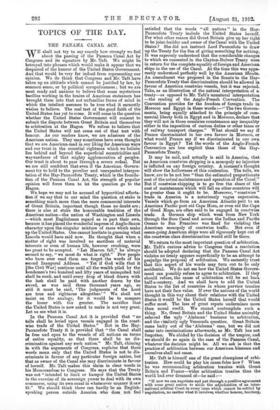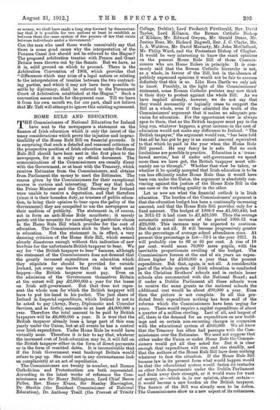TOPICS OF THE DAY.
THE PANAMA CANAL ACT.
WE shall not try to say exactly how strongly we feel about the passing of the Panama Canal Act by Congress and its signature by Mr. Taft. We might be betrayed into phrases which would make it appear that we despaired of the honour of the United States Government. And that would be very far indeed from representing our opinion. We do think that Congress and Mr. Taft have taken up an attitude which cannot bo justified by law, by common sense, or by political scrupulousness ; but we are most ready and anxious to believe that some mysterious bacillus working in the brains of American statesmen has brought them into that not unfamiliar frame of mind in which the intellect assumes to be true what it earnestly wishes to believe. The real test of the good faith of the United States has yet to come. It will come in the question whether the United States Government will consent to submit the dispute between Great Britain and themselves to arbitration at the Hague. We refuse to believe that the United States will not come out of that test with honour. As our readers know, we are admirers of the American nation. They may sometimes have even thought that we are American-mad in our liking for American ways and our trust in the essential rightness which we believe lies behind and beyond the superficial eccentricities and waywardness of that mighty agglomeration of peoples. Our trust is about to pass through a severe ordeal. But we are still confident that even if the American Govern- ment try to hold to the peculiar and unexpected interpre- tation of the Hay-Pauncefote Treaty, which is the founda- tion of the Panama Canal Act, the strength of popular opinion will force them to let the question go to the Hague.
We hope we may not be accused of hypocritical affecta- tion if we say that to our mind the question at stake is something much more than the mere commercial interests of Great Britain, important though those no doubt are ; there is also at stake the honourable tradition of the American nation—the nation of Washington and Lincoln —which most Englishmen regard as in part their own, because it has placed the wonderful impress of Anglo-Saxon character upon the singular mixture of races which make up the United States. One cannot hesitate in guessing what Lincoln would have said now. He thought that when a Matter of right was involved no sacrifices of material interests or even of human life, however crushing, were too great to be accepted. " Let Heaven fall," he always seemed to say, " we must do what is right." Few people who have ever read them can forget the words of his second Inaugural Address. " Yet if God wills that it [the Civil War] continue until all the wealth piled by the bondsmen's two hundred and fifty years of unrequited toil shall be sunk, and until every drop of blood drawn with the lash shall be paid with another drawn by the sword, as was said three thousand years ago, so still it must be said, The judgments of the Lord are true and righteous altogether.' " We shall not insist on the analogy, for it would be to compare the lesser with the greater. The sacrifice that the United States is now asked to make is not very great. Let us see what it is.
In the Panama Canal Act it is provided that " no tolls shall be levied upon vessels engaged in the coast- wise trade of the United States." But in the Hay- Pauncefote Treaty it is provided that " the Canal shall be free and open to the vessels of all nations on terms of entire equality, so that there shall be no dis- crimination against any such nation." Mr. Taft, chiming in with the arguments of Congress, explains that these words mean only that the United States is not to dis- criminate in favour of any particular foreign nation, but that as owner of the Canal she may discriminate in favour of herself. Mr. Taft makes this olaim in clear words in his Memorandum to Congress. He says that the Treaty was not "intended to limit or hamper the United States in the exercise of its sovereign rower to deal with its own commerce, using its own canal in whatsoever manner it saw fit." We should think there can hardly be an English- speaking person outside America, who does not feel satisfied that the words " all nations " in the Hay- Pauncefote Treaty include the United States herself. For what other reason did Great Britain give up her right to be joint-builder and owner of the Canal with the United States ? She did not instruct Lord Pauncefote to draw up the Treaty for the fun of giving something for nothing. It was expressly understood that the considerable changes to which we consented in the Clayton-Bulwer Treaty were in return for the complete equality of foreign and American ships in the use of the Canal. At the time this was appa- rently understood perfectly well by the American SZnate. An amendment was proposed in the Senate to the Hay- Pauncefote Treaty that discrimination should be allowed in favour of American coastwise vessels, but it was rejected. Take, as an illustration of the natural interpretation of a. treaty—as opposed to Mr. Taft's unnatural interpretation —the reading of the Anglo-French Convention. The Convention provides for the freedom of foreign trade in Morocco and Egypt in these words :—" The two Govern- ments, being equally attached to the principle of com- mercial liberty both in Egypt and in Morocco, declare that they will not in those countries countenance any inequality either in the imposition of custom duties or other taxes or of railway transport charges." What should we say if France discriminated in her own favour in Morocco, or what would France say if we discriminated in our own favour in Egypt ? Yet the words of the Anglo-French Convention are less explicit than those of the Hay- Pauncefote Treaty.
It may be said, and actually is said in America, that as American coastwise shipping is a monopoly- no injustice is inflicted on any foreign country. A moment's thought will show the hollowness of this contention. The tolls, we know, are to be not less "than the estimated proportionate cost of the actual maintenance and operation of the Canal." But if coastwise shipping is to go free the share of the cost of maintenance which will fall on other countries will be greater than it ought to be. Moreover, " coastwise " trade in America is a notoriously vague expression. Vessels which go from an American Atlantic port to an American Pacific port viol Cape Horn, or even vii the Caps of Good Hope, are often said to be engaged in coastwise trade. A German ship which went from New York through the Suez Canal and across the Indian and Pacific Oceans to San Francisco was fined for violating the American monopoly of coastwise traffic. But even if ocean-going American ships were all rigorously kept out of the coastwise class discrimination would still be there.
We return to the most important question of arbitration. Mr. Taft's curious advice to Congress that a resolution should be adopted declaring that the Panama Canal Act violates no treaty appears superficially to be an attempt to prejudge the proposal of arbitration. We earnestly trust that this aspect of his words may turn out to be only accidental. We do not see how the United States Govern- ment can possibly refuse to agree to arbitration. If they should refuse, the cause of arbitration will be set back half-a-century. And we shall have to add the United States to the list of countries in whose purview treaties have not their face value. If ever the nations of the world thought in this way about their relations with the United States it would be the United States herself that would suffer most. The loss of great repute undermines more than moral credit. We cannot contemplate such a thing. No, Great Britain and the *United States amicably referred the ugly Alabama.' business to arbitration, and the similarly ugly Venezuela question. Great Britain came badly out of the Alabama ' case, but we did not enter into recriminations afterwards, as Mr. Taft has not forgotten. We abided by the decision of the umpire, and we should do so again in the case of the Panama Canal, whatever the decision might be. All we ask is that the practice of arbitration between our American kinsmen and ourselves shall not cease.
Mr. Taft is himself one of the great champions of arbi- tration. How could he play his cause-false now ? When he was recommending arbitration treaties, with Great Britain. and France—wider arbitration treaties than the world bad ever dreamed of—he said :— "If now we can negotiate and put through a positive agreement with some great nation to abide the adjudication of an inter-. national arbitral Court in every issue which cannot be settled by negotiation, no matter what it involves, whether honour, territory,
or money, we shall have made a long step forward by demonstrat- ing that it is possible for two nations at least to establish as between them the same system of due process of law that exists between individuals under a Government."
Can the man who used those words conceivably say that there is some good cause why the interpretation of the Panama Canal Act should not be referred to the Hague ? The proposed arbitration treaties with France and Great Britain were thrown out by the Senate. But we have, as it is, solid ground on which to proceed. There is the Arbitration Convention of 1908, which provides that " differences which may arise of a legal nature or relating to the interpretation of treaties between the two contract- ing parties, and which it may not have been possible to settle by diplomacy, shall be referred to the Permanent Court of Arbitration established at the Hague." Such a, convention seems made for the present case. Till we learn it from his own mouth we, for our part, shall not believe that Mr. Taft will attempt to ignore this existing agreement.



































 Previous page
Previous page